
Research
Security News
Malicious PyPI Package Exploits Deezer API for Coordinated Music Piracy
Socket researchers uncovered a malicious PyPI package exploiting Deezer’s API to enable coordinated music piracy through API abuse and C2 server control.
@thi.ng/rstream
Advanced tools
Reactive streams & subscription primitives for constructing dataflow graphs / pipelines

This project is part of the @thi.ng/umbrella monorepo.
Reactive streams & subscription primitives for constructing dataflow graphs / pipelines.
This library provides & uses three key building blocks for reactive programming:
(No value judgments implied - there's room for both approaches!)
merge()
/sync())STABLE - used in production
Search or submit any issues for this package
Completely revised & improved error handling, stronger
distinction between .subscribe() and .transform() methods & internal
simplification of their implementations.
All error handlers now MUST return a boolean to indicate if the error was recoverable from or should put the subscription into the error state. See error handling for details.
The options given to .transform() and .map() can now include an error
handler:
// transform stream with given transducer(s)
// and forward any errors to `handleError` (user defined fn)
src.transform(xf1, xf2,..., { error: (e) => { ... } });
// or, also new, provide everything as single options object
// (for this version, see note (1) below)
src.transform({ xform: map(...), error: handleError });
.subscribe(sub, xform, opts) signature has been removed and the xform
(transducer) must now be given as part of the options object:const src = reactive(1);
// old
src.subscribe(trace("foo"), filter((x) => x < 10), { id: "child-sub" });
// new, see note (1) below
src.subscribe(trace("foo"), { xform: filter((x) => x < 10), id: "child-sub" });
.transformTopic() and updated signatures for .subscribeTopic(), both in
similarity to above.type Event = { id: string; value: any; };
const src = pubsub<Event>({ topic: (e) => e.id });
// transform topic stream with given transducer (see note (1) below)
// and forward any errors to `handleError` (user defined fn)
src.transformTopic("foo", map((e) => e.value), { error: handleError })
Notes:
comp(). Other
signatures of .transform() method support up to 4 transducers and composes
them automatically.yarn add @thi.ng/rstream
// ES module
<script type="module" src="https://unpkg.com/@thi.ng/rstream?module" crossorigin></script>
// UMD
<script src="https://unpkg.com/@thi.ng/rstream/lib/index.umd.js" crossorigin></script>
Package sizes (gzipped, pre-treeshake): ESM: 5.56 KB / CJS: 5.75 KB / UMD: 5.71 KB
Several demos in this repo's /examples directory are using this package.
A selection:
| Screenshot | Description | Live demo | Source |
|---|---|---|---|
 | Interactive image processing (adaptive threshold) | Demo | Source |
 | Figlet-style bitmap font creation with transducers | Demo | Source |
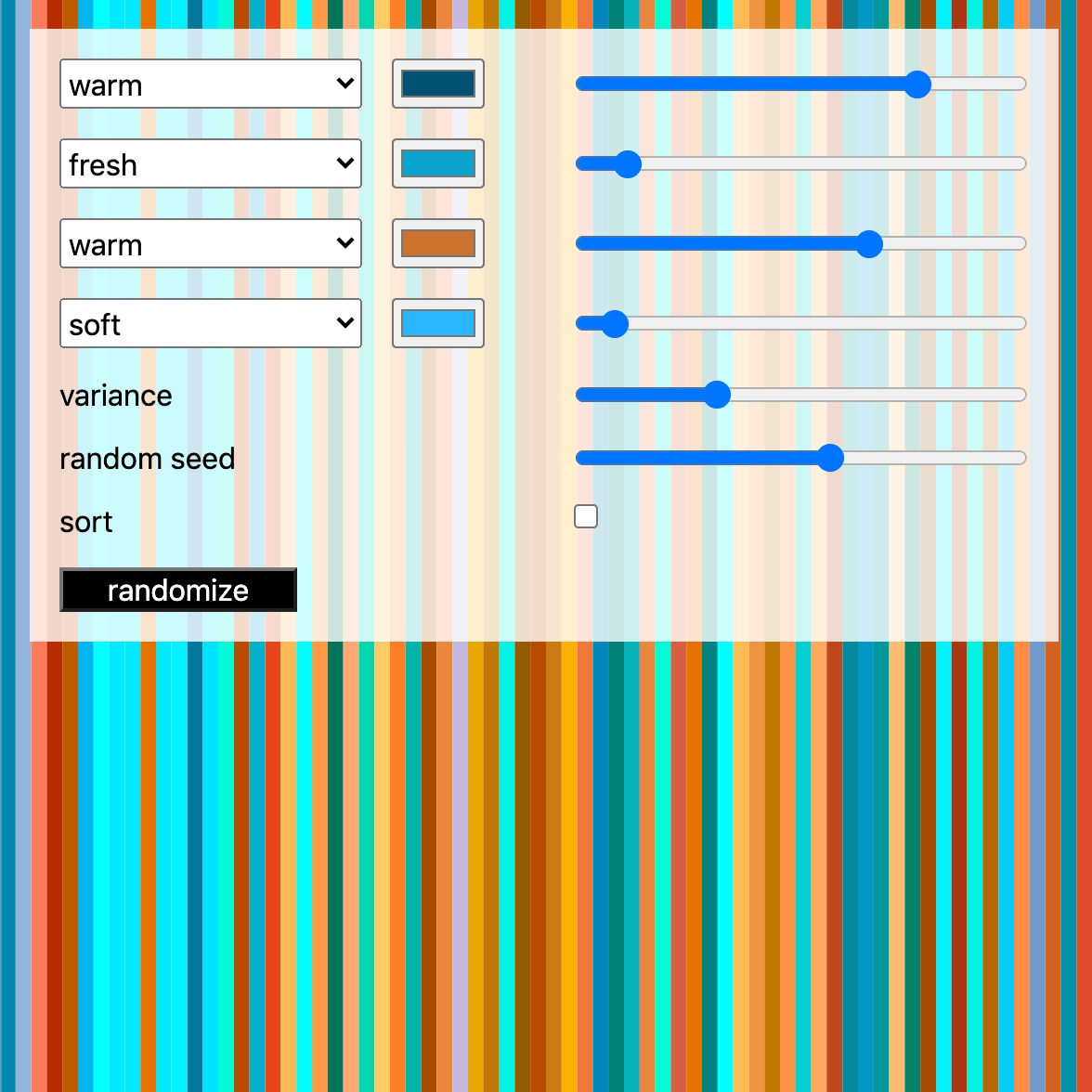 | Probabilistic color theme generator | Demo | Source |
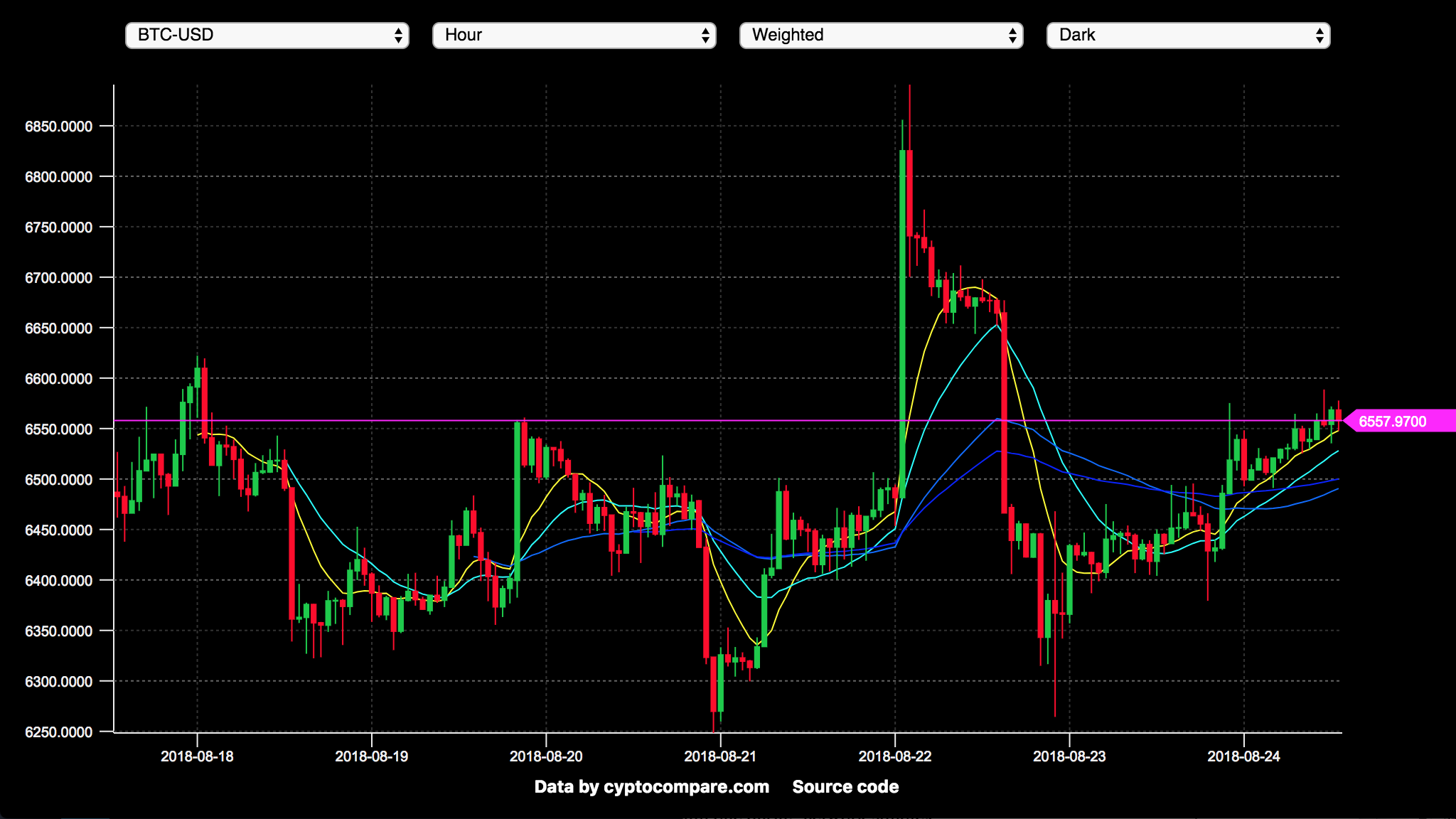 | Basic crypto-currency candle chart with multiple moving averages plots | Demo | Source |
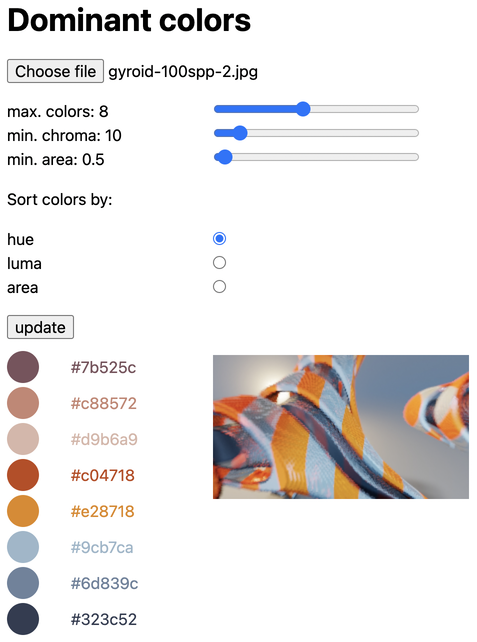 | Color palette generation via dominant color extraction from uploaded images | Demo | Source |
 | Interactive pattern drawing demo using transducers | Demo | Source |
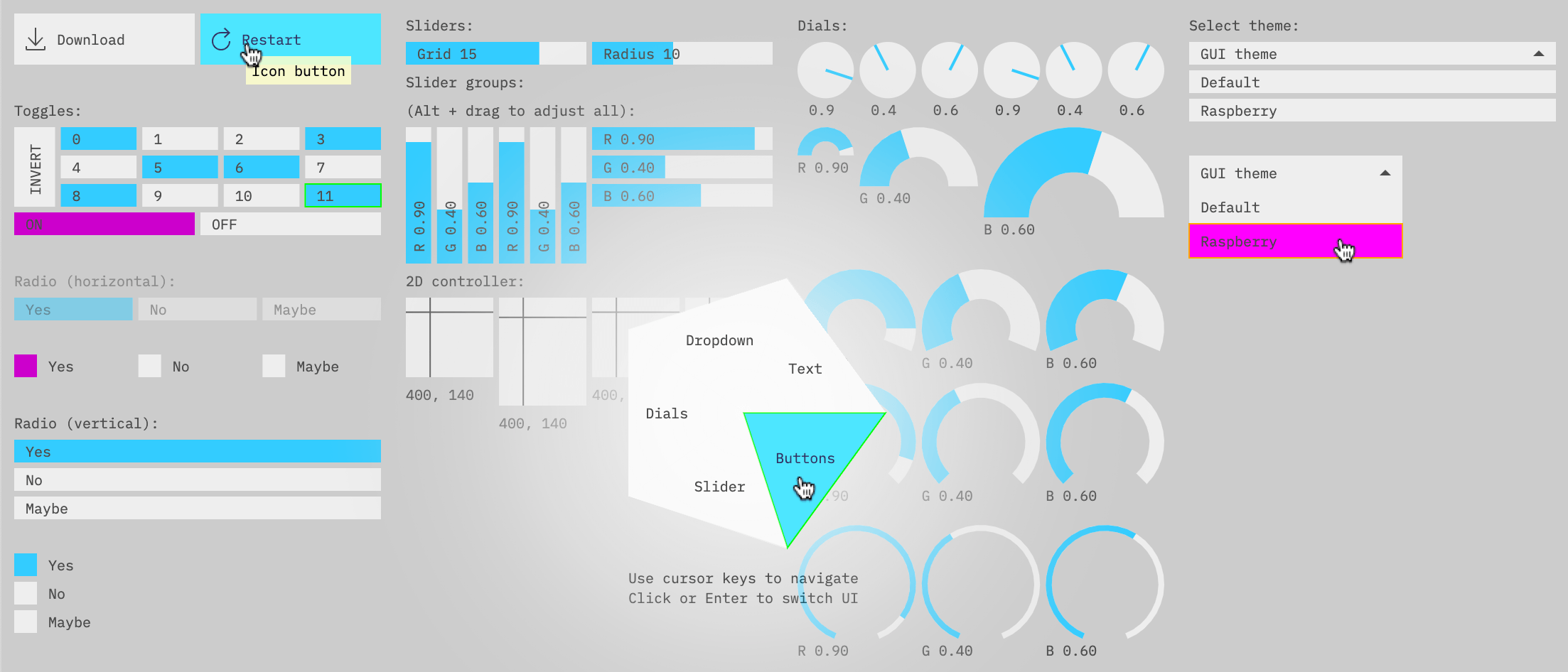 | Canvas based Immediate Mode GUI components | Demo | Source |
 | Worker based, interactive Mandelbrot visualization | Demo | Source |
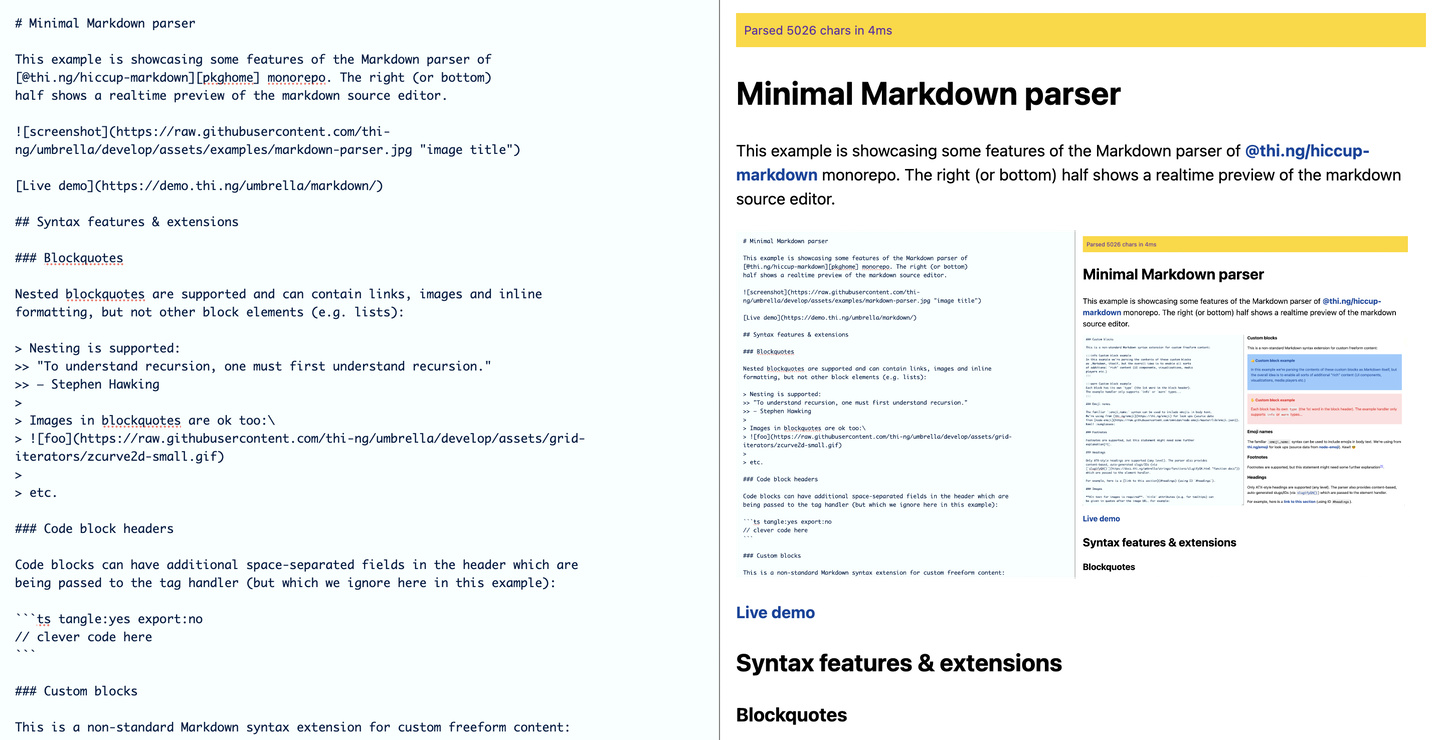 | Minimal Markdown to Hiccup to HTML parser / transformer | Demo | Source |
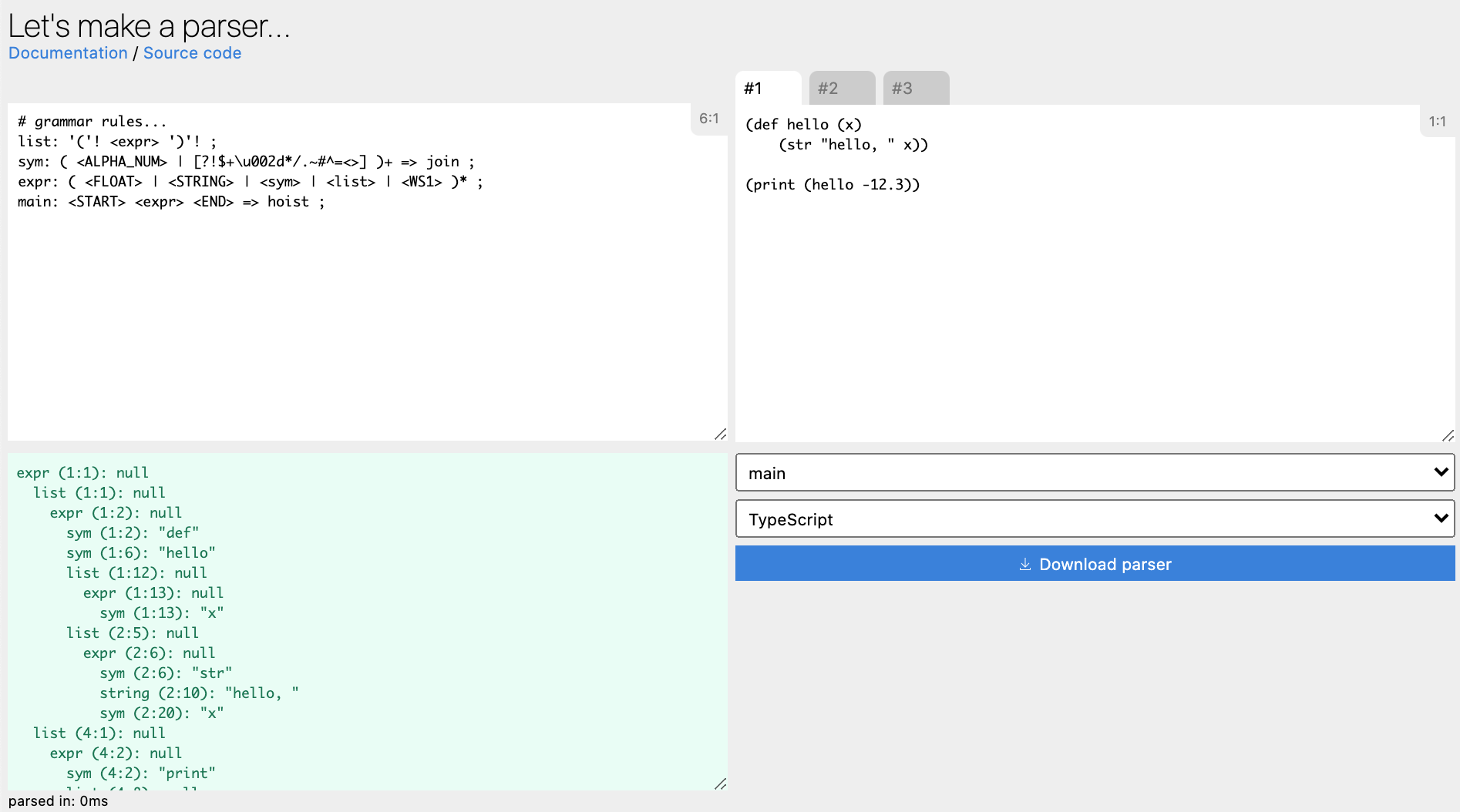 | Parser grammar livecoding editor/playground & codegen | Demo | Source |
| Interactive pixel sorting tool using thi.ng/color & thi.ng/pixel | Demo | Source | |
| Demonstates various rdom usage patterns | Demo | Source | |
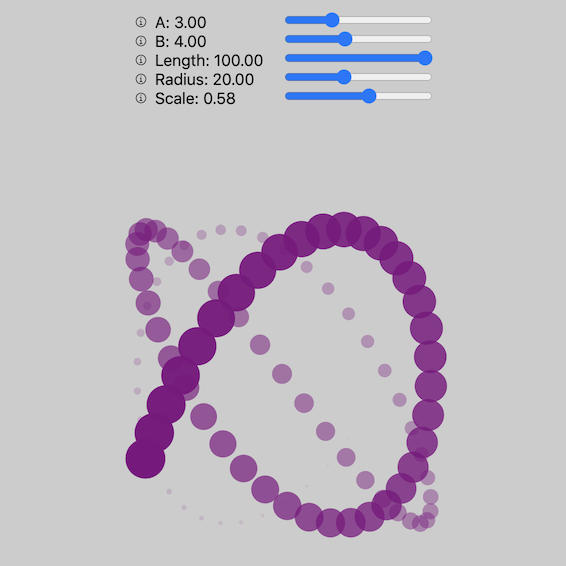 | rdom & hiccup-canvas interop test | Demo | Source |
| Full umbrella repo doc string search w/ paginated results | Demo | Source | |
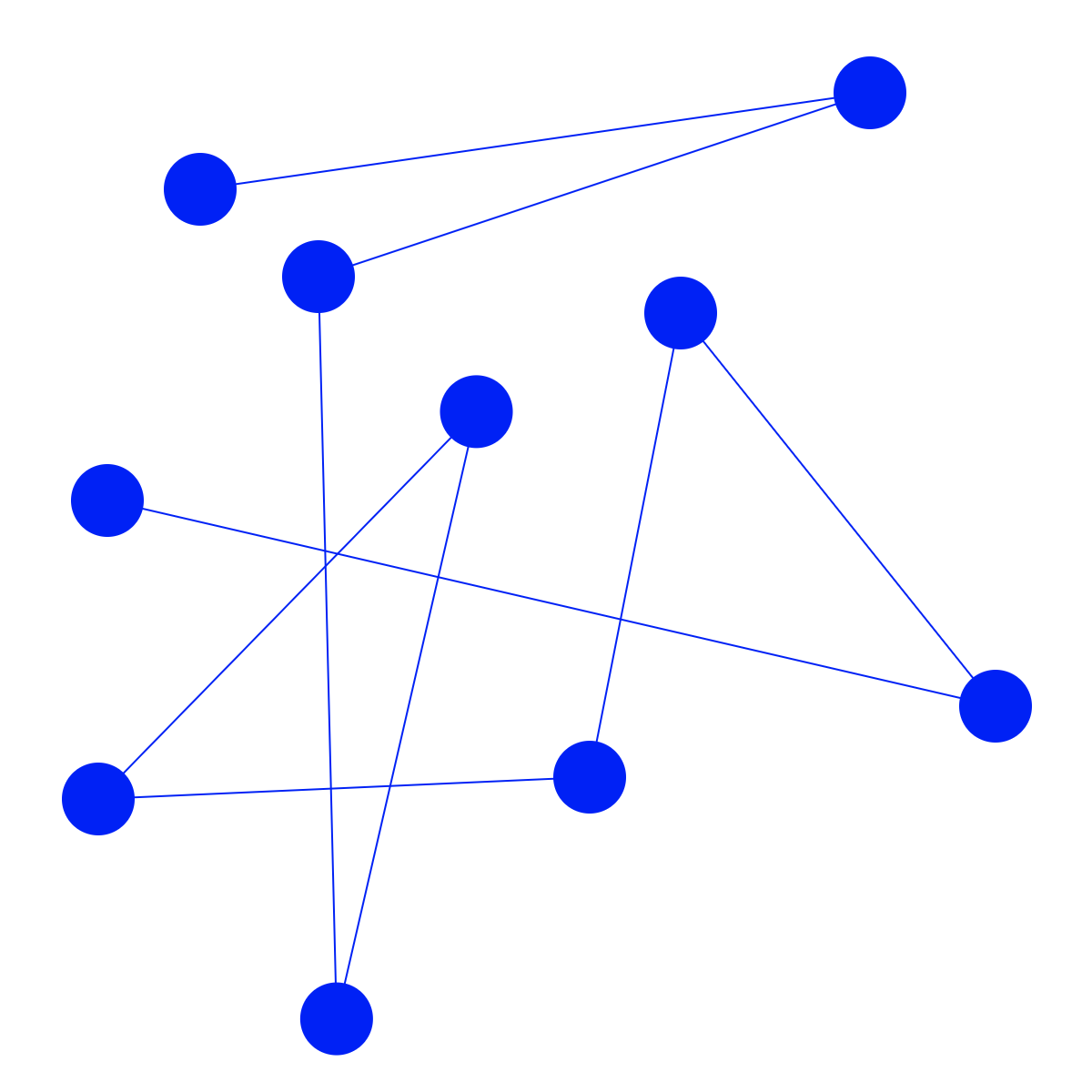 | rdom powered SVG graph with draggable nodes | Demo | Source |
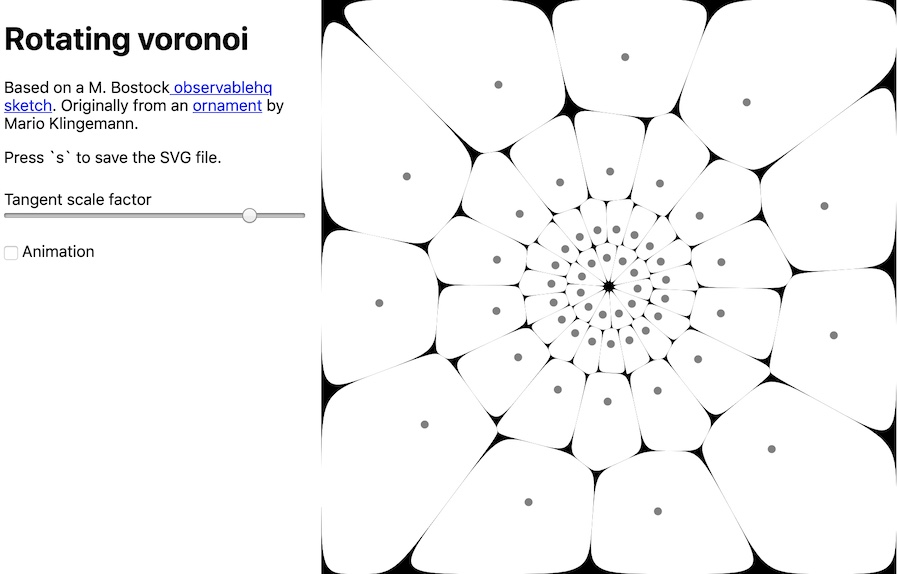 | Animated Voronoi diagram, cubic splines & SVG download | Demo | Source |
 | Minimal demo of using rstream constructs to form an interceptor-style event loop | Demo | Source |
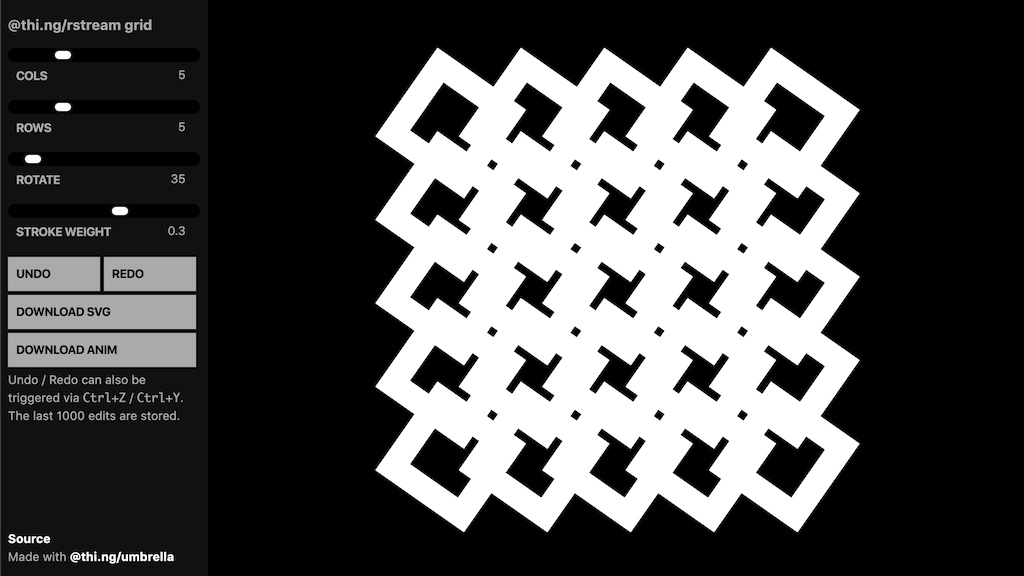 | Interactive grid generator, SVG generation & export, undo/redo support | Demo | Source |
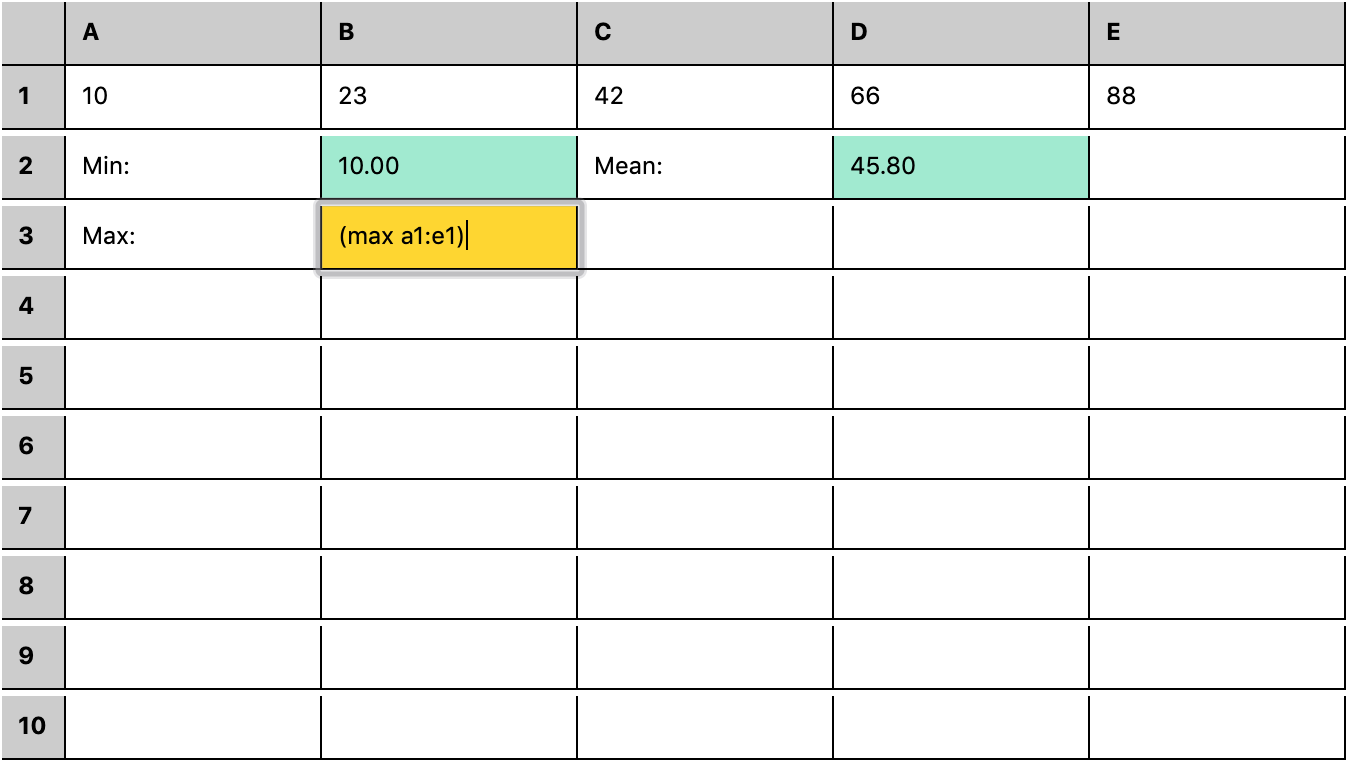 | rstream based spreadsheet w/ S-expression formula DSL | Demo | Source |
 | Fork-join worker-based raymarch renderer | Demo | Source |
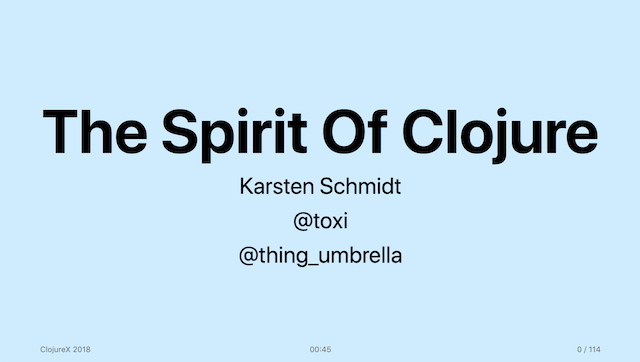 | hdom based slide deck viewer & slides from my ClojureX 2018 keynote | Demo | Source |
| Transducer & rstream based hdom UI updates | Demo | Source |
Since version 3.0.0 all stream and subscription factory functions take an optional object of configuration options with at least these keys (each optional):
interface CommonOpts {
/**
* Internal ID associated with this stream. If omitted, an
* autogenerated ID will be used.
*/
id: string;
/**
* If false or `CloseMode.NEVER`, the stream stays active even if
* all inputs are done. If true (default) or `CloseMode.LAST`, the
* stream closes when the last input is done. If `CloseMode.FIRST`,
* the instance closes when the first input is done.
*
* @defaultValue CloseMode.LAST
*/
closeIn: CloseMode;
/**
* If false or `CloseMode.NEVER`, the stream stays active once there
* are no more subscribers. If true (default) or `CloseMode.LAST`,
* the stream closes when the last subscriber has unsubscribed. If
* `CloseMode.FIRST`, the instance closes when the first subscriber
* disconnects.
*
* @defaultValue CloseMode.LAST
*/
closeOut: CloseMode;
/**
* If true (default), stream caches last received value and pushes
* it to new subscriberswhen they subscribe. If false, calling
* `.deref()` on this stream will always return `undefined`.
*
* @defaultValue true
*/
cache: boolean;
}
Source: stream()
Creates a new Stream instance, optionally with given StreamSource
function and / or ID. If a src function is provided, the function
will be only called (with the Stream instance as single argument)
once the first subscriber has attached to the stream. If the function
returns another function, it will be used for cleanup purposes if the
stream is cancelled, e.g. if the last subscriber has unsubscribed.
Streams are intended as (primarily async) data sources in a dataflow
graph and are the primary construct for the various from*()
functions provided by the package. However, streams can also be
triggered manually (from outside the stream), in which case the user
should call stream.next() to cause value propagation.
a = stream<number>((s) => {
s.next(1);
s.next(2);
s.done();
});
a.subscribe(trace("a"));
// a 1
// a 2
// a done
// as reactive value mechanism
b = stream<number>();
// or alternatively
// b = subscription();
b.subscribe(trace("b1"));
b.subscribe(trace("b2"));
// external trigger
b.next(42);
// b1 42
// b2 42
Stream (like all other types of Subscription) implements the
@thi.ng/api
IDeref
interface which provides read access to a stream's last received value.
This is useful for various purposes, e.g. in combination with
@thi.ng/hdom, which supports direct embedding of streams (i.e. their
values) into UI components (and will be deref'd automatically). If the
stream has not yet emitted a value or if the stream is already done, it
will deref to undefined.
Furthermore, all subscription types can be configured (via the cache
option) to NOT retain their last emitted value, in which case .deref()
will always return undefined.
Source: subscription()
Creates a new Subscription instance, the fundamental datatype &
building block provided by this package (Streams are Subscriptions
too). Subscriptions can be:
IDeref interface// as reactive value mechanism (same as with stream() above)
s = subscription<any, any>();
s.subscribe(trace("s1"));
s.subscribe(trace("s2"), tx.filter((x) => x > 25));
// external trigger
s.next(23);
// s1 23
s.next(42);
// s2 42
// s1 42
stream() with initial valueSource: metaStream()
MetaStreams are streams of streams. A MetaStream is a subscription
type which transforms each incoming value into a new stream, subscribes
to it (via an hidden / internal subscription) and then only passes
values from that stream to its own subscribers. If a new value is
received, the meta stream first unsubscribes from the possibly still
active stream created from the previous input, before creating and
subscribing to the new stream. Hence this stream type is useful for
cases where streams need to be dynamically and invisibly created &
inserted into an existing dataflow topology without changing it, and
with the guarantee that never more than one of these is active at the
same time. Similar behavior (without the restriction in number) can be
achieved using merge() (see further below).
The user supplied factory function will be called for each incoming
value and is responsible for creating the new stream instances. If the
function returns null / undefined, no further action will be taken
(acts like a filter transducer, i.e. the incoming value is simply
ignored).
// transform each received odd number into a stream
// producing 3 copies of that number in the metastream
// even numbers are ignored
a = metastream<number, string>(
(x) => (x & 1)
? fromIterable(tx.repeat("odd: " + x, 3), { delay: 100 })
: null
);
a.subscribe(trace())
a.next(23)
// odd: 23
// odd: 23
// odd: 23
a.next(42) // not odd, ignored by meta factory fn
a.next(43)
// odd: 43
// odd: 43
// odd: 43
The factory function does NOT need to create new streams, but too can merely return other existing streams, and so making the meta stream act like a switch / stream selector.
If the meta stream is the only subscriber to these input streams, you'll
need to use the closeOut: CloseMode.NEVER option when creating the
inputs. This keeps them alive and allows for dynamic switching between
them.
// infinite inputs
a = fromIterable(
tx.repeat("a"),
{ delay: 1000, closeOut: CloseMode.NEVER }
);
b = fromIterable(
tx.repeat("b"),
{ delay: 1000, closeOut: CloseMode.NEVER }
);
// stream selector / switch
m = metaStream((x) => x ? a : b);
m.subscribe(trace("meta from: "));
m.next(true);
// meta from: a
m.next(false);
// meta from: b
m.next(true);
// meta from: a
Source: merge()

Returns a new StreamMerge instance, a subscription type consuming
inputs from multiple inputs and passing received values on to any
subscribers. Input streams can be added and removed dynamically. By
default, StreamMerge calls done() when the last active input is
done, but this behavior can be overridden via the close option, using
CloseMode enums.
merge({
// input streams w/ different frequencies
src: [
fromIterable([1, 2, 3], { delay: 10 }),
fromIterable([10, 20, 30], { delay: 21 }),
fromIterable([100, 200, 300], { delay: 7 })
]
}).subscribe(trace());
// 100
// 1
// 200
// 10
// 2
// 300
// 3
// 20
// 30
Use the labeled()
transducer
for each input to create a stream of labeled values and track their
provenance:
merge({
src: [
fromIterable([1, 2, 3]).transform(tx.labeled("a")),
fromIterable([10, 20, 30]).transform(tx.labeled("b")),
]
}).subscribe(trace());
// ["a", 1]
// ["b", 10]
// ["a", 2]
// ["b", 20]
// ["a", 3]
// ["b", 30]
See StreamMergeOpts for further reference of the various behavior options.
If the StreamMerge receives a Subscription-like value from any of
its inputs, it will not be processed as usual, but instead will be added
as new input to the merge and then automatically remove once that stream
is exhausted.
// stream source w/ transducer mapping values to new streams
a = stream().transform(tx.map((x) => fromIterable(tx.repeat(x, 3))));
// simple 1Hz counter
b = fromInterval(1000);
merge({ src: [a, b] }).subscribe(trace());
// 0
// 1
// 2
// sent "a" will be transformed into stream via above transducer
// and then auto-added as new input to the StreamMerge
a.next("a");
// a
// a
// a
// 3
// 4
Source: sync()

Similar to StreamMerge above, but with extra synchronization of
inputs. Before emitting any new values, StreamSync collects values
until at least one has been received from all inputs. Once that's the
case, the collected values are sent as labeled tuple object to
downstream subscribers. Each value in the emitted tuple objects is
stored under their input stream's ID. Only the last value received from
each input is passed on. After the initial tuple has been emitted, you
can choose from two possible behaviors:
reset option is true, every input will have to provide at
least one new value again until another result tuple is produced.Any done inputs are automatically removed. By default, StreamSync
calls done() when the last active input is done, but this behavior can
be overridden via the close constructor option, using CloseMode enums.
const a = stream();
const b = stream();
s = sync<any,any>({ src: { a, b } }).subscribe(trace("result: "));
a.next(1);
b.next(2);
// result: { a: 1, b: 2 }
Input streams can be added and removed dynamically and the emitted tuple size adjusts to the current number of inputs (the next time a value is received from any input).
If the reset option is enabled, the last emitted tuple is allowed to
be incomplete, by default. To only allow complete tuples, also set the
all option to false.
The synchronization is done via the
partitionSync()
transducer from the @thi.ng/transducers package. See this function's
docs for further details.
See StreamSyncOpts for further reference of the various behavior options.
Source: pubsub()

Topic based stream splitter. Applies topic function to each
received value and only forwards it to child subscriptions for
returned topic. The actual topic (return value from topic fn) can
be of any type, apart from undefined. Complex topics (e.g objects /
arrays) are allowed and they're matched with registered topics using
@thi.ng/equiv by default (but customizable via equiv option).
Each topic can have any number of subscribers.
If a transducer is specified for the PubSub, it is always applied
prior to passing the input to the topic function. I.e. in this case
the topic function will receive the transformed inputs.
PubSub supports dynamic topic subscriptions and unsubscriptions via
subscribeTopic() and unsubscribeTopic(). However, the standard
subscribe() / unsubscribe() methods are NOT supported (since
meaningless here) and will throw an error! unsubscribe() can only be
called WITHOUT argument to unsubscribe the entire PubSub instance
(incl. all topic subscriptions) from the parent stream.
Source: bisect()
Returns a new PubSub instance using given predicate pred as boolean
topic function and a & b as subscribers for truthy (a) and falsy
b values.
fromIterable([1, 2, 3, 4]).subscribe(
bisect((x) => !!(x & 1), trace("odd"), trace("even"))
);
// odd 1
// even 2
// odd 3
// even 4
// odd done
// even done
If a or b need to be subscribed to directly, then a / b MUST be
first created as Subscription (if not already) and a reference kept
prior to calling bisect().
const odd = subscription();
const even = subscription();
odd.subscribe(trace("odd"));
odd.subscribe(trace("odd x10"), tx.map((x) => x * 10));
even.subscribe(trace("even"));
fromIterable([1, 2, 3, 4]).subscribe(bisect((x) => !!(x & 1), odd, even));
// odd x10 10
// odd 1
// even 2
// odd x10 30
// odd 3
// even 4
// odd done
// odd x10 done
// even done
Source: sidechainPartition()
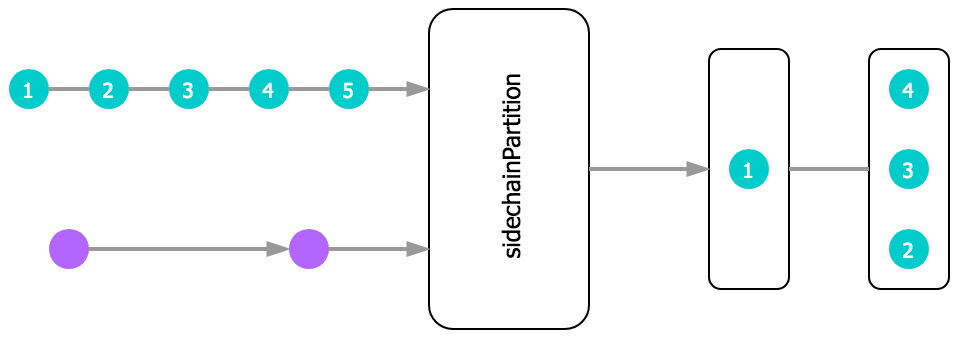
Buffers values from src until side chain fires, then emits buffer
(unless empty) and repeats process until either input is done. By
default, the value read from the side chain is ignored, however the
optional predicate can be used to only trigger for specific values /
conditions.
// merge various event streams
merge([
fromEvent(document, "mousemove"),
fromEvent(document, "mousedown"),
fromEvent(document, "mouseup")
])
// queue event processing to only execute during the
// requestAnimationFrame cycle (RAF)
.subscribe(sidechainPartition(fromRAF()))
.subscribe(trace());
Source: sidechainToggle()

Filters values from input based on values received from side chain. By default, the value read from the side chain is ignored, however the optional predicate can be used to only trigger for specific values/conditions. Every time the predicate fn returns true, the filter will be toggled on/off. Whilst switched off, no input values will be forwarded.
// use slower interval stream to toggle main stream on/off
fromInterval(500)
.subscribe(sidechainToggle(fromInterval(1000)))
.subscribe(trace());
// 0
// 3
// 4
// 7
// 8
...
Source: forkJoin()

const $self: Worker = <any>self;
self.addEventListener("message", (e) => {
const { buf, factor } = e.data;
$self.postMessage(buf.map((x) => x * factor));
});
const src = stream<number[]>();
// fork worker jobs & re-join results
forkJoin({
src: src,
// worker job preparation
// this function is called for each worker ID and the results
// of that function are the messages sent to the workers...
fork: (id, numWorkers, buf) => {
const size = (buf.length / numWorkers) | 0;
return {
buf: id < numWorkers - 1
? buf.slice(id * size, (id + 1) * size)
: buf.slice(id * size),
factor: id * 10
};
},
// re-join worker results
join: (parts) => <number[]>Array.prototype.concat.apply([], parts),
// worker script
worker: "./worker.js",
// default: navigator.hardwareConcurrency
numWorkers: 4
}).subscribe(trace("results"));
src.next(new Array(16).fill(1));
// result: [0, 0, 0, 0, 10, 10, 10, 10, 20, 20, 20, 20, 30, 30, 30, 30]
Source: tunnel()
Delegate stream value processing to workers and pass on their responses to downstream subscriptions. Supports multiple worker instances and worker termination / restart for each new stream value received.
Source: postWorker()
Send values to workers (incl. optional (inline) worker instantiation)
Source: fromWorker()
Create value stream from worker messages.
Detailed information, discussion & diagrams about the new error handling can be found in this issue
The ISubscriber interface supports optional error handlers which will be
called if code in the next() or done() handlers throws an error. If no error
handler is defined for a subscriber, the wrapping Subscription's own error
handler will be called, which might put this subscription into an error
state and stop it from receiving new values.
src = subscription({ next(x) { throw x; } });
// triggers error, caught by subscription wrapper
src.next(1);
// sub-0 unhandled error: 1
src.getState() === State.ERROR
// true
// no error, but also inputs won't be received/processed either
src.next(2)
// another sub with error handler & indicating error could be handled
src = subscription({
next(x) { throw x; },
error(x) { console.warn("eeek", x); return true; }
});
// error caught by given handler
src.next(1)
// eeek 1
// sub still usable, no error
src.getState() !== State.ERROR
// true
// further inputs still accepted
src.next(2)
// eeek 2
If this project contributes to an academic publication, please cite it as:
@misc{thing-rstream,
title = "@thi.ng/rstream",
author = "Karsten Schmidt and others",
note = "https://thi.ng/rstream",
year = 2017
}
© 2017 - 2021 Karsten Schmidt // Apache Software License 2.0
FAQs
Reactive streams & subscription primitives for constructing dataflow graphs / pipelines
The npm package @thi.ng/rstream receives a total of 339 weekly downloads. As such, @thi.ng/rstream popularity was classified as not popular.
We found that @thi.ng/rstream demonstrated a healthy version release cadence and project activity because the last version was released less than a year ago. It has 0 open source maintainers collaborating on the project.
Did you know?

Socket for GitHub automatically highlights issues in each pull request and monitors the health of all your open source dependencies. Discover the contents of your packages and block harmful activity before you install or update your dependencies.

Research
Security News
Socket researchers uncovered a malicious PyPI package exploiting Deezer’s API to enable coordinated music piracy through API abuse and C2 server control.

Research
The Socket Research Team discovered a malicious npm package, '@ton-wallet/create', stealing cryptocurrency wallet keys from developers and users in the TON ecosystem.

Security News
Newly introduced telemetry in devenv 1.4 sparked a backlash over privacy concerns, leading to the removal of its AI-powered feature after strong community pushback.